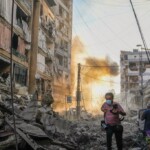One gnawing thought still clings to war reporter Trey Yingst about the October 7, 2023, terror attack on Israel which he replays in his head over and over: It could have been me.
As the barbaric Hamas rampage of Israel — which left 1,200 dead and 240 taken as hostages — was taking place, Fox News’ Yingst was hurtling toward the scene.
“One of the things that’s still with me is how close my team and I were to death on that fateful morning,” he writes in his new book “Black Saturday,” (FOX News Books), noting that a split-second decision about stopping at an intersection in Israel’s battered south, may have meant the difference between life and death.
“If we’d kept going… we would have found ourselves right in the midst of the carnage, under attack by Hamas gunmen. Would I have tried to reason with the gunmen before they killed me? Would I have explained in Arabic that I was a journalist?
“Would they have murdered me anyway?”
As Chief Foreign Correspondent for Fox, Yingst has burnished his reputation in war zones around the world for the last decade at the frontlines in Afghanistan, Iraq and Ukraine.
But nothing prepared him for the past year, when he was woken up inside his Tel Aviv apartment at 7am on what’s become known as “Black Saturday,” the largest slaughter of Jews since the Holocaust.
In his gripping firsthand account, Yingst, 31, talks to soldiers, civilians, leaders in Israel and figures in Hamas that paint a devastating portrait of the cost of war. He writes about entering Gaza five separate times on military embeds — a correspondent’s attachment to military units in armed conflict — and witnessing tense firefights between Israel and Hamas.
As he tried to get a handle on the scope of the attacks, in the midst of the confusion and shock on October 7, reporting from the scene would become a delicate needle to thread.
“Stick to the facts and avoid opinion or emotion-based analysis,” he told himself.
“I had prepared for this day for years, hoping it would never come,” he writes.
“I felt I was built for this moment.”
In the bloody year that followed, Yingst spent nearly 200 days on the ground covering the attacks and its aftermath as the Israel-Hamas war has unfolded.
“October 7th was one of the most horrific things that I’ve witnessed. The aftermath of this massacre was gruesome. It was bloody, it was tangible. We felt it, we saw it, we smelled the bodies, we saw the people who were killed,” he told The Post while reporting from northern Israel, where fighting with Hezbollah has intensified, this week.
“I think about that day a lot because we were so close to dying,” he said. “We saw the people who were killed. We saw the people who didn’t have the luck that we had because that’s really what it was – it was luck. There was no strategy to the fact that we survived that day.”
And terror nearly hit very close to home on Black Saturday.
Yoav, the engineer in Yingst’s tight-knit crew, was agonizing over the fate of his brother, Gil, who lived about a mile from the Gaza border in Kibbutz Nir Oz.
The isolated community was overrun when hundreds of terrorists methodically slaughtered or kidnapped about one quarter of its 400 residents – and Yoav was unable to connect with Gil and his wife of 40 years, Michal.
Terrorists had entered their home and set fire to it as the naked couple barricaded themselves in their safe room without a lock.
The army rescued them alive some 11 hours later.
The early days in a post-October 7 reality took their toll on the journalist, with triggers at every turn.
During a visit to Kibbutz Kfar Aza, one of the hardest-hit communities along the Gaza border, Yingst witnessed a funeral for one of at least 62 residents who were brutally murdered that day, with more taken hostage.
Walking through the crime scene home of the Kutz family, who spent years living in Boston, with a New England Patriots hat still on display, left him “numb.”
The bedroom was “a pool of dried blood,” Yingst writes – the bed, floor and walls.
The family of five was discovered in bed with dad, Aviv, “embracing his loved ones,” he writes.
The stench overwhelmed the normally stoic reporter, who darted off to practice breathing exercises.
“I felt like I was going to vomit,” he writes.
The unflinching sights of carnage – of families murdered alive wholesale – proved to wear down Yingst in the early days.
“I had started to struggle, in silence, with what we’d seen in the first few days,” he writes. “We’re taught in journalism school how to report – not how to clean someone else’s blood off the bottom of your shoes, as I had to do again and again.”
Israel War Update
Get the most important developments in the region, globally and locally.
Thanks for signing up!
The psychological toll even played out in his subconscious – like when he’d wake up panicked from a bad dream in which he’s tortured and tossed into a mass grave.
Or his childhood home is under attack and he’s scrambling for safety.
The unspeakable brutality and bloodshed on October 7 and its aftermath changed him.
“I think I am constantly becoming more empathetic as a war correspondent. I think the more war that I see, the more I want to advocate for peace because it truly is the most horrific thing,” he said, adding somberly, “There are no winners in war and this war is no different.”
His greatest message that he strives to drive home, both in his reporting and on his social media pages, is to “remind people to stay human, to be empathetic,” he said.
“Don’t lose your humanity.”
And he’s taking his own advice – trying to be kind to himself in the wake of his PTSD from covering the frontlines as a war correspondent.
He focuses on “dealing with what we see in the healthiest way possible,” he said, turning to cold showers, eating clean and abstaining from alcohol.
“I think it’s really easy for people to slip into unhealthy habits when you experience these things and you have that strain on your mental health. I don’t want to be one of those people,” he said.
“I’ve seen so many of the great war correspondents ruin their lives with drugs and alcohol,” he writes in the book, noting his empathy for their plight.
“I’ve also determined not to fall down that rabbit hole.”
After six years based in the Middle East and covering the war for the past year, reintegrating into civilian life comes with real bumps.
“It’s a culture shock,” he said of a brief return to New York which included attending a friend’s wedding.
“You have to go from being talking about missile and rocket attacks to talking about the weather and sports,” he lamented, adding he finds it “a little challenging to reintegrate into society.”
Yingst decided to cut a trip back to New York short when it became clear Israeli forces were to head into Lebanon this week, making the concept of a work-life balance mostly off the table.
“People will say it’s unhealthy and I don’t care,” he said.
“This is what I’m passionate about – this is my identity, my calling .”
Still, he has no plans to trade his multiple bulletproof vests for a desk job anytime soon.
“I lived through the massacre, watching people die in front of us,” he said.
“I feel even more driven to make sure that this story gets told.”






